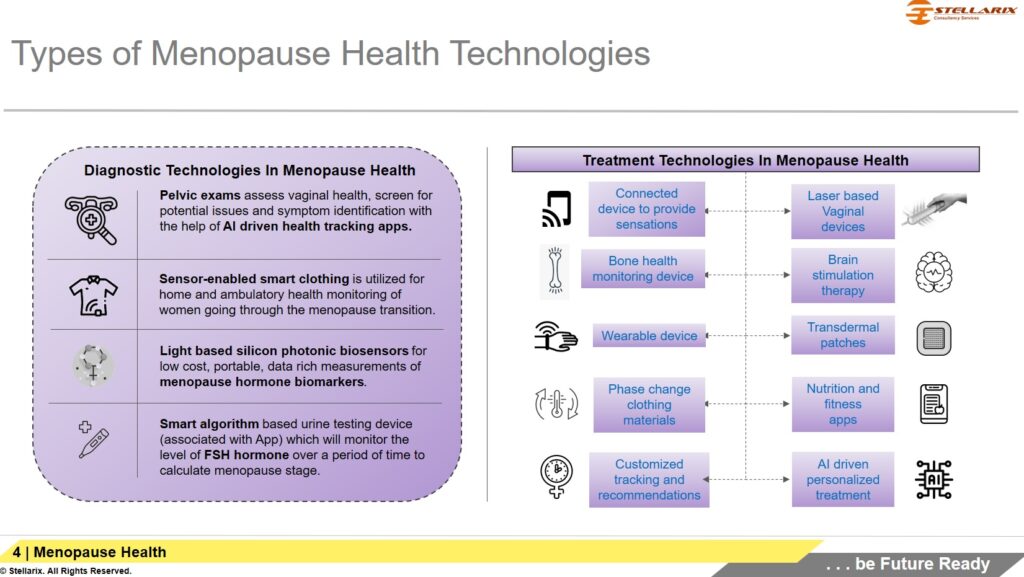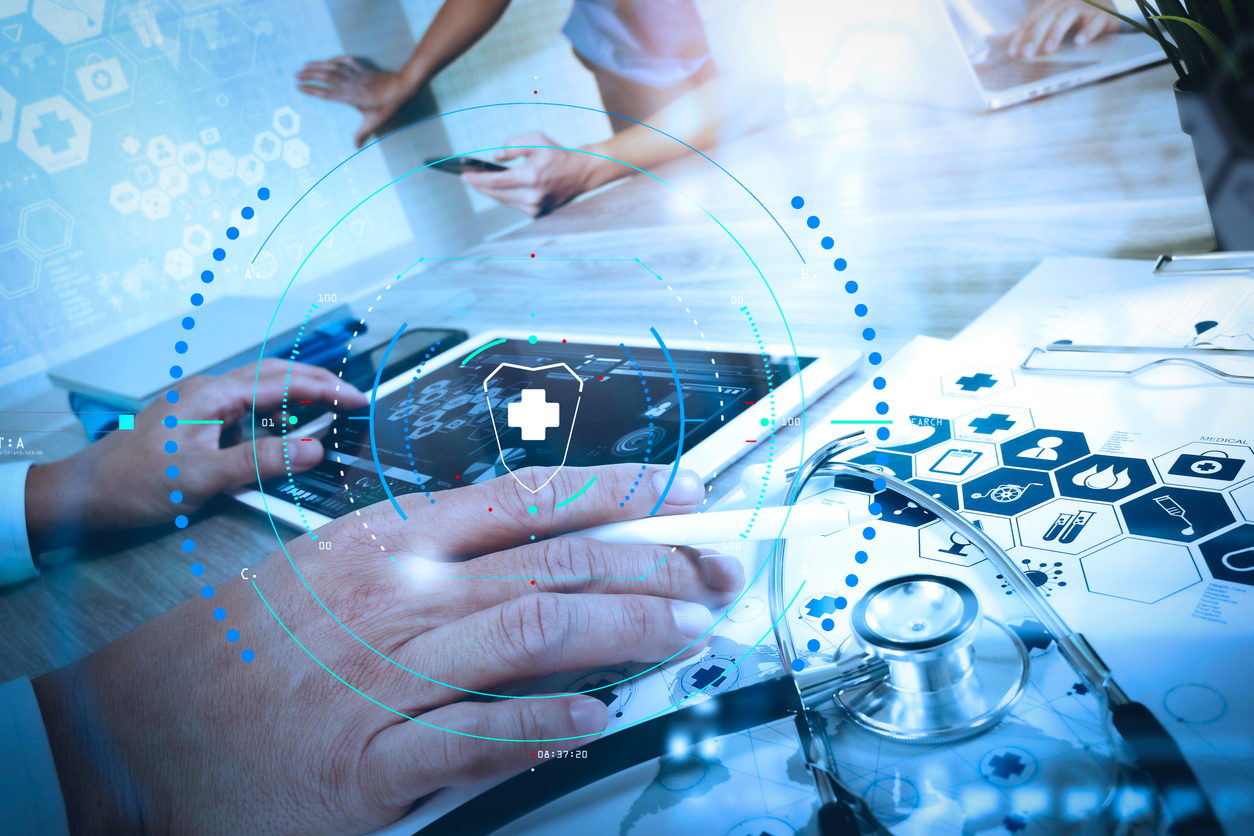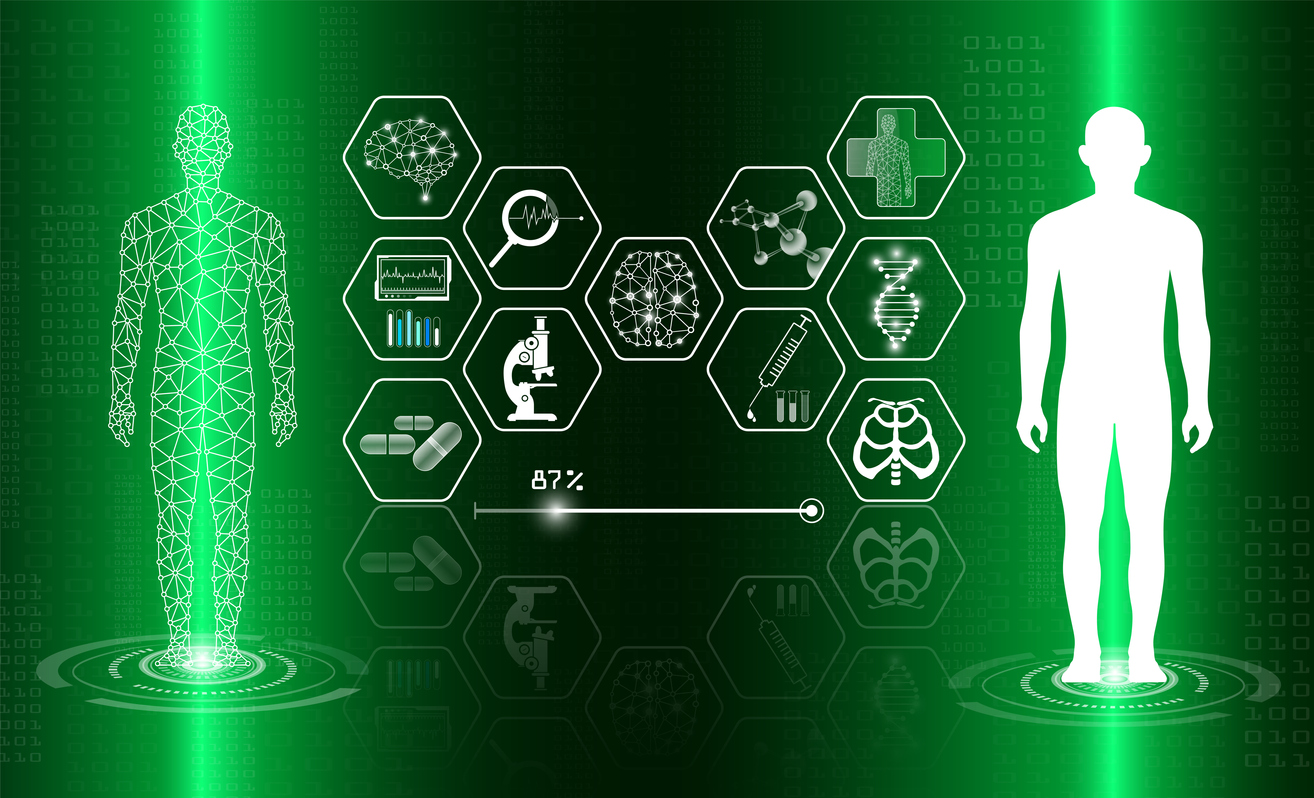Transforming Menopause Health: Innovations and Path Forward
Menopause health technologies encompass a wide range of medical and digital innovations intended to address the health concerns and symptoms associated with menopause. These technologies can include hormonal therapies, non-hormonal treatments, lifestyle and dietary interventions, and digital solutions such as mobile apps and wearable devices designed to monitor and manage menopausal symptoms. These technologies, ranging from hormone replacement therapy (HRT) to symptom-tracking apps, are designed to offer support, relief, and personalized care for women experiencing menopause.
Furthermore, technologies are designed to monitor cardiovascular health and evaluate bone density in menopausal women. These developments aim to enhance the well-being and quality of life of people going through the menopausal transition.
Menopause is a natural stage in a woman’s life that occurs when her ovaries stop producing eggs and estrogen levels decrease. The average age range for this to occur is 45 to 55, though it can vary from woman to woman. During menopause, many women experience physical and emotional changes, including hot flashes, mood swings, and vaginal dryness. Menopausal women should lead a healthy lifestyle that includes regular exercise, a balanced diet, and enough sleep to manage symptoms and reduce the risk of complications such as osteoporosis and heart disease.
A new generation of companies is already leveraging telemetrics, data, and the quantified-self movement to develop scientifically led services and products that employ science to help us make smarter decisions about how we age. They are bound by the desire to stamp out pseudoscience and assist in the validation of women’s personal experiences using substantial data sets. This will aid in providing much-needed relief to women’s neglected health needs and benefit them in their personal and professional lives.

Diagnosis and treatment technologies in menopause health have significantly evolved to improve the assessment, understanding, and management of various menopause health conditions
- Diagnosis Technologies: Primarily involves screening for potential issues and symptom identification with the help of AI-driven health tracking apps, sensor-enabled smart clothing, light-based silicon photonic biosensors for hormone trackers, smart algorithms-based urine testing devices, etc.
- Treatment Technologies: Encompass a range of interventions aimed at managing menopausal symptoms and associated health concerns, including laser-based vaginal devices, brain stimulation therapy, transdermal patches, AI-driven personalized treatment, etc.
Trending Technologies
Digital monitoring technologies play a significant role in menopause health by providing women with tools to track, manage, and understand their symptoms and overall well-being. These technologies include:

Mobile Apps: Apps designed for menopausal health allow users to log symptoms such as hot flashes, mood changes, and sleep patterns and can provide insights into patterns and potential triggers. Some apps also offer educational resources and support communities.
Wearable Devices: Various wearable gadgets, such as smartwatches and fitness trackers, offer features that allow for the tracking of physiological parameters relevant to menopausal health, such as heart rate, sleep patterns, and activity levels. Some devices also incorporate features for tracking stress levels and providing guidance on relaxation techniques.
Hormonal Tracking Devices: Some devices enable women to track hormone levels through urine or saliva samples, providing insight into hormonal fluctuations associated with menopause.
Telemedicine Platforms: Telehealth services enable menopausal individuals to connect with healthcare providers remotely for consultations, monitoring, and management of menopausal symptoms, offering convenience and accessibility.
These digital monitoring technologies empower women to take an active role in managing their menopausal health, gain insights into their symptoms, and make informed decisions about their care with the support of accurate data and professional guidance.
Recent Activities
A few fearless pioneers are revolutionizing the world of menopause globally. While they are smashing taboos and making genuine progress in women’s health, many seem to be approaching it in a similar way with telehealth apps. While this is clearly a needed approach, it also shows that there is still opportunity for even greater innovation and entrepreneurial activity in this industry.
- The Elektra platform helps menopausal and peri-menopausal women stay on top of their game by offering telehealth, continuous and personalized education, and community support.
- My Modern Menopause’s Vera offers an online assessment for women to determine their hormone status. A doctor-recommended test follows this: a finger-prick test. Finally, the doctor creates a hormone profile report with recommendations for managing the symptoms based on the results.
- Caria has an AI-powered app with chatbot features to demonstrate the effectiveness of their strategy for menopause healthcare.
- Joylux is developing wellness devices like vSculpt and vFit Gold to improve menopause symptoms, including sexual function, bladder control, vaginal atrophy, and dryness. The devices use red light to tighten the vaginal canal and restore tissue health.
- The Thermaband Zone is a connected device that aids in thermoregulation in menopausal women. The band is worn on the inner wrist and provides cooling or heating sensations to help manage hot flushes.
- University of British Columbia researchers have introduced a light-based sensor to identify menopause markers. Silicon photonic integrated circuits containing biosensors for urine-based detection of an initial panel of two hormone biomarkers relevant to menopause (expandable to tens in the future).
Menopause Ecosystem

The menopause market is becoming increasingly competitive as a wide range of businesses enter it and develop new products and services to cater to the needs of women going through menopause. Competition is expected to intensify as the industry expands, forcing businesses to stand out via innovation, efficacy, and safety to capture market share.
Future of Menopause Health
As we head towards a future that is more empathetic towards women during this pivotal time and taken more seriously due to expanding scientific studies and data sets, we see many other positive knock-on effects coming, too. The future of menopause healthcare is likely to see significant advancements in treatment options, support services, and overall understanding of menopausal symptoms and their impact on women’s health. The development of precision medicine has allowed healthcare providers to tailor treatment plans for menopausal symptoms based on a woman’s health profile, genetic predispositions, and specific symptoms. More accessibility to telemedicine services and remote monitoring tools may be part of the future of menopause healthcare, enabling women to receive specialized care and support regardless of their location.
Let's Take the Conversation Forward
Reach out to Stellarix experts for tailored solutions to streamline your operations and achieve
measurable business excellence.



